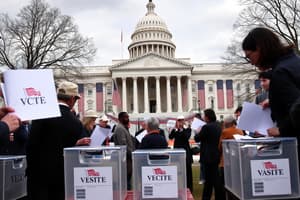Podcast
Questions and Answers
What is one of the key aspects of citizen participation in the democratic process?
What is one of the key aspects of citizen participation in the democratic process?
- Attending city council meetings (correct)
- Watching TV at home
- Ignoring public debates
- Avoiding voting
How do citizens influence the direction of policies in a democracy?
How do citizens influence the direction of policies in a democracy?
- By not engaging with their representatives
- By avoiding voting
- By ignoring local initiatives
- By participating in public debates (correct)
Why is voting considered a significant form of citizen participation?
Why is voting considered a significant form of citizen participation?
- Voting has no impact on election outcomes
- Voting is a way to express citizens' voices and interests (correct)
- Voting is only done by a select few individuals
- Voting helps select representatives based on height
What does organizing protests and petitions help citizens achieve in a democracy?
What does organizing protests and petitions help citizens achieve in a democracy?
Why is citizen engagement with local government crucial for building trust within communities?
Why is citizen engagement with local government crucial for building trust within communities?
What is essential for ensuring government accountability in a democracy?
What is essential for ensuring government accountability in a democracy?
What is a key factor that promotes accountability in government?
What is a key factor that promotes accountability in government?
How do the roles of citizens and government entities typically interact?
How do the roles of citizens and government entities typically interact?
How have advancements in technology transformed the democratic process?
How have advancements in technology transformed the democratic process?
What role do social media platforms and online forums play in the democratic process?
What role do social media platforms and online forums play in the democratic process?
How would you describe the relationship between citizens and governments in the context of the democratic process?
How would you describe the relationship between citizens and governments in the context of the democratic process?
Flashcards are hidden until you start studying
Study Notes
Democratic Process
The democratic process is a continuous cycle of action, where citizens engage in various forms of participation, governments represent their will, and both parties hold each other accountable for the outcome. At its core, democracy relies on checks and balances to ensure fairness and equality while fostering meaningful interactions between citizens and their representatives.
Citizen Participation
Citizens play a crucial role in the democratic process by actively engaging in the decision-making process. Some key aspects include:
- Voting: One of the most significant forms of participation is casting a ballot during elections. Every vote counts towards selecting those who represent citizens' voices and interests.
- Protests and Petitions: When citizens feel passionately about an issue, they may organize protests or petition their representatives to bring attention to their cause.
- Public Debate: Open discussions and debates allow citizens to share opinions and ideas, shaping the public discourse and influencing the direction of policies.
- Engagement with Local Government: Attending city council meetings, speaking during public comment sessions, and participating in local initiatives helps build trust within communities.
Government Accountability
Ensuring government accountability is equally vital in the democratic process. Key factors promoting accountability include transparency in decision-making, oversight through various branches of government, and checks against potential abuses of power.
Interaction Between Citizens and Government
While citizens and government entities operate independently, their respective roles frequently overlap. For instance, when a conflict arises between these two sectors, courts may need to intervene to uphold principles of justice, impartiality, and fairness.
Impact of Technology on the Relationship
Advancements in technology have transformed the democratic process by enabling faster communication, information dissemination, and increased accessibility. Social media platforms and online forums allow discussions to happen in real-time, bridging geographical boundaries and encouraging diverse perspectives.
Conclusion
The dynamic relationship between citizens and governments in the context of the democratic process is ever-evolving and multifaceted. Both citizens and governments must continually adapt to changing circumstances, ensuring ongoing interaction, engagement, and accountability throughout the process.
Studying That Suits You
Use AI to generate personalized quizzes and flashcards to suit your learning preferences.




